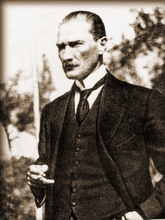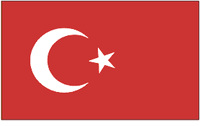At the time of Mustafa Kemal's arrival in Sofia, the Bulgarians "had been generally regarded as among the most backward of the sultan's subjects." [page 130 of Mango's biography] Yet something happened to transform them, which "amazed the Turks". Mango reports that this transformation has been attributed to the work of "'popular enlighteners'—nationalist teachers who imparted new learning as they went out to the people in the spirit of the Russian narodniks (populists)."
Mango reports that the Bulgarian transformation made a deep impression on Mustafa Kemal, "who was later to adopt populism (halkçılık) as one of the six basic principles of the Turkish republic."
I'm not familiar with populism as an explicit idea. The Wikipedia link defines it as "a discourse which supports 'the people' versus 'the elites'." In the post-serf era in which the Narodniks were born, that definition is understandable. How exactly does that term applies to the Turkish context? I look forward to learning.
In the meantime, what's important here is the impression his Sofia experience made on him and its eventual impact on Turkey.
Wednesday, May 14, 2008
Monday, May 12, 2008
Gökalp
Occasionally, Mustafa Kemal listened, and to no one more carefully than to Ziya (Gökalp), an intellectual born in Diyarbakır, in the Kurdish area.... Like many of his contemporaries, Gökalp was strongly influenced by French writers, in his case particularly by the sociologist Emile Durkheim (1858-1917), from whom he derived his notion of religion as social cement. Religion, Gökalp believed, inspired culture, which was specific to individual national societies, while civilization, meaning primarily science and technology, was universal. Like other members of the CUP, Gökalp started by defending the concept of a common Ottoman patriotism. But, before long, he became the chief ideologist of a Western-oriented Turkish nationalism, based not on ethnic origin, but on common culture and language.... Mustafa Kemal learnt from him 'the ideals of nationalism and of populism, which were to inform the republic of Turkey...'.[page 95/96 of Andrew Mango's biography]Continuing his report of the "intellectual ferment" (and how!) of this period, Mr. Mango reports: "An influential literary review, Genç Kalemler (Young Pens), campaigned for a simpler Turkish language, relying more on its own vocabulary than on borrowings from Arabic and Persian. It was in Genç Kalemler that Ziya Gökalp published his celebrated poetic manifesto of Pan-Turanianism, the romantic ideology which sought the union of all Turkic-speaking peoples:
The country of the Turks is not Turkey, nor yet Turkistan,Fascinating.
Their country is a vast and eternal land: Turan!
Friday, May 9, 2008
Ali Fuat on the French Revolution
Mr. Mango reports (on pages 48-49) that Ali Fuat wrote the following about the feelings of the cadets in Atatürk's class in military high school:
This information was news to me. Fascinating.
At the same, it's not too surprising given Mr. Mango's report in his introduction on page 6: "The Ottoman's connection with the French was old. It went back to the alliance concluded in 1541 between Sultan Süleyman I (Suleiman the Magnificient) and Francis I of France against the Habsburg emperor Charles V."
My appreciation of Mr. Mango's work increases with each page I read. It's expanding my knowledge of an important part of world history. I welcome learning more about Atatürk and, in effect, about modern Turkish history.
Sultan Adülhamit II, in whose honour we had to shout 'Long live our Padishah' several times a day, gradually lost lustre in our eyes. We were indignant at the treatment of young enlightened supporters of freedom in the medical school who were sent into exile and whose careers were ruined. One day we might meet the same fate. As we heard that the government worked badly, that corruption was rife, that civil servants and officers did not receive their pay, while secret policemen and courtiers, covered in gold braid, received not only their pay but purses full of gold, our confidence in the sultan, which was not strong at the best of times, was totally shaken. We saw that delivered into incompetent hands, the army was losing its effectiveness and prestige...But no one dared ask 'Where are we going? Where are you taking the country?' Afraid of the sultan and his secret policemen, people were plunged in abject oriental resignation...There was no freedom in the country. As young students in the War College, we had read in secret and learnt the importance given to human rights and freedoms in the declarations of the French Revolution.Mr. Mango reports that Alex Jevakhoff, Atatürk's French biographer, that the French Revolution and its Declaration of Human Rights "was to be 'the supreme point of reference' throughout his life."
This information was news to me. Fascinating.
At the same, it's not too surprising given Mr. Mango's report in his introduction on page 6: "The Ottoman's connection with the French was old. It went back to the alliance concluded in 1541 between Sultan Süleyman I (Suleiman the Magnificient) and Francis I of France against the Habsburg emperor Charles V."
My appreciation of Mr. Mango's work increases with each page I read. It's expanding my knowledge of an important part of world history. I welcome learning more about Atatürk and, in effect, about modern Turkish history.
Dancing
Mr. Mango reports on page 41 ("The Making of an Ottoman Officer"):
Mustafa Kemal's determination to succeed...drove him to acquire not only professional skill, but also social graces. He dazzled his friend Ali Fuat with his ability to waltz. Dancing, he declared, was an essential accomplishment for a staff officer.I especially like this aspect of Atatürk.
Turkish: Then and Now
Mr. Mango reports on page 41 ("The Making of an Ottoman Officer"):
Mr. Mango's report continues:
...It was thus at the school in Manastır that Atatürk began acquiring his mastery of literary Ottoman, a euphonious and euphuistic idiom, where Arabic abstract nouns crowd together in alliterative groups of synonyms to raise the emotional tone rather than to clarify the meaning.Good epistemological food for thought. I've filed it away for future reference.
Mr. Mango's report continues:
Atatürk became an effective writer and speaker of this artificial tongue, which served him well in his public appearances. Unfortunately, it is now incomprehensible in its original form to Turkish readers, for whom translations into simple Turkish have to be provided.This I had heard during my studies of Turkish. Ironic.
Thursday, May 8, 2008
7 April 1913
Mr. Mango reports:
On 7 April 1913, Ahmet Izzet Paşa informed the Composite Force in Gallipoli that Muslim clergy were to be sent to raise the morale of the troops [following the fall of Edirne]. Mustafa Kemal sent a curt reply the following day, saying his brother officers and regimental chaplain were giving the troops all the advice that was necessary and that the despatch of extra preachers would serve only to propagate the view that the soldiers were demoralized, and that the authorities were reduced to prayerful supplications.Impressive.
Tuesday, May 6, 2008
Printing Press Delay
Andrew Bey writes (page 5; introduction)
...It was not until 1727 that a Hungarian from Transylvania, who had converted from Unitarianism to Islam, was able to set up in Istanbul a first printing press using Arabic characters. It was closed down after a few years, and printing had to be reintroduced later.Interesting.
Rulers vs unbelievers
In Mr. Mango's (Andrew Bey) introduction to his biography of Atatürk, he writes (on page 5)
Since [the Ottoman rulers] possessed revealed truth which had shown its worth during the expansion of Ottoman power, they were reluctant to turn to unbelievers for anything other than technical advice. When they did so, they had to disguise their purpose. In any case, the official ideology of the state was an obstacle to innovation.This report fascinates me. In substance, it echoes the same experience many have in modern American business. That is, many managers and executives conduct themselves as if they possess revealed truth. Most who report to them are deemed, in effect, unbelievers to whom they turn only for technical advice. Though, in this case, their purpose is not disguised. What is often covered up or glossed over is the significance of the immense dedication needed to acquire and develop the specialized knowledge that produces competent technical advice. In any event, the unofficial ideology of the current state of common American management is an obstacle to innovation.
Sunday, May 4, 2008
Atatürk biography
In a Sante Fe, New Mexico bookstore, I found a copy of the biography of Atatürk by Andrew Mango. It's excellent. It's rich with details of the context in which Atatürk (and, in effect, modern Turkey) was born. As if I didn't already have enough motivation to learn Turkish, this fine biography has added fuel to the fire.
Michael Doran, Washington Post Book World, writes that Mango's biography is "the best in the English language." I can't judge that for myself since it's the only biography I've seen so far of Atatürk. Though I'm only 106 pages into it, I can say that's it comprehensive, even going into the Enlightenment era French philosophy that influenced Atatürk and his contemporaries.
As my schedule permits, I'll be posting some excerpts from the book.
Michael Doran, Washington Post Book World, writes that Mango's biography is "the best in the English language." I can't judge that for myself since it's the only biography I've seen so far of Atatürk. Though I'm only 106 pages into it, I can say that's it comprehensive, even going into the Enlightenment era French philosophy that influenced Atatürk and his contemporaries.
As my schedule permits, I'll be posting some excerpts from the book.
Subscribe to:
Posts (Atom)

